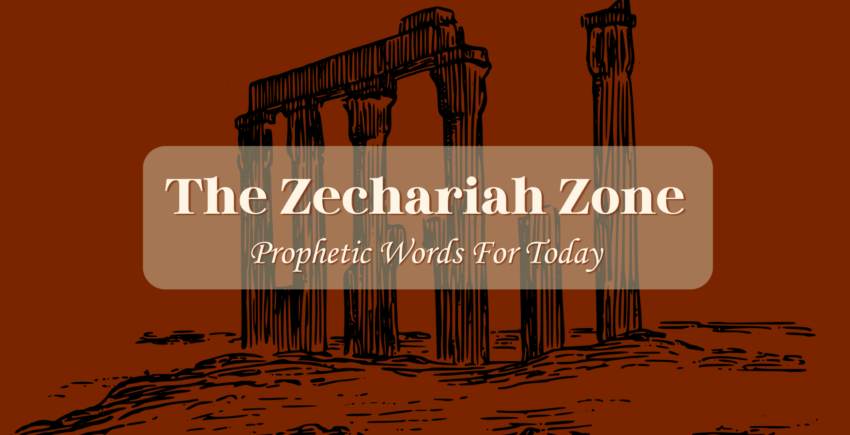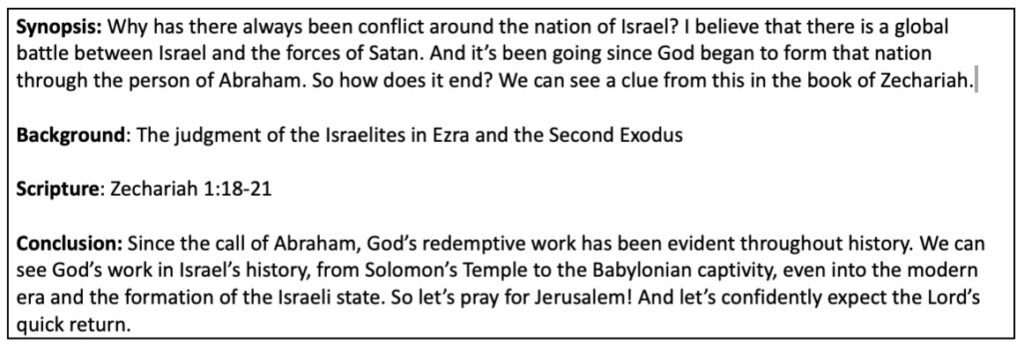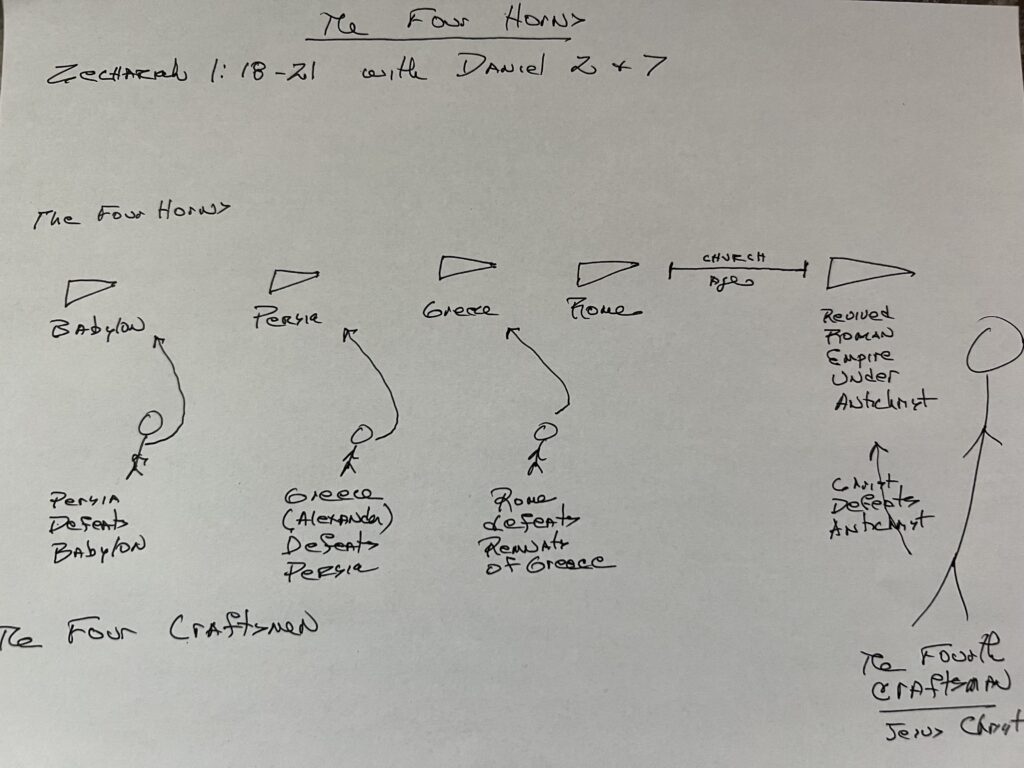
The Global Battle Against Israel and How It Will End
A Study of Zechariah 1:18-21


There is a global battle against the nation of Israel, and it’s nothing new, but it’s also not going to end until the very moment that Christ returns.
Now, as we continue our study of the book of Zechariah, I want to remind you that we must begin in the book of Ezra. If you want to follow the basic transcript of this message along with a handmade stick-figure drawing that will help you visualize the vision, you can find it right now on my most recent blog at Robertjmorgan.com. If you’re listening to this at your desk or armchair, it might be helpful.
Background
Over time throughout the history of Israel in the Old Testament, the nation became increasingly evil. Some of the accounts of what they did are shocking to read. The people descended into wickedness, until finally, in 587 B.C., the Babylonian Empire of Nebuchadnezzar overwhelmed the nation of Israel, burned its capital, destroyed its temple, and deported its people into refugee camps in Babylon. And the country remained desolate for seventy years. In the meantime, Babylon itself was defeated by the Persians, and the Persian Emperor Cyrus became the most powerful man on earth.
Then, in fulfillment of the prophecy of Jeremiah, God moved the heart of Cyrus to allow some of the Jews to return to Jerusalem and restore their city and rebuild their temple. This happened in 539 B.C.
Ezra 1:1 says: In the first year of Cyrus king of Persia, in order to fulfill the word of the Lord spoken by Jeremiah, the Lord moved the heart of Cyrus king of Persia to make a proclamation throughout his realm and also to put it in writing:
2 “This is what Cyrus king of Persia says: “‘The Lord, the God of heaven, has given me all the kingdoms of the earth and he has appointed me to build a temple for him at Jerusalem in Judah.
3 Any of his people among you may go up to Jerusalem in Judah and build the temple of the Lord, the God of Israel, the God who is in Jerusalem, and may their God be with them. 4 And in any locality where survivors may now be living, the people are to provide them with silver and gold, with goods and livestock, and with freewill offerings for the temple of God in Jerusalem.’”
Nothing was more important to the Jewish people than rebuilding their temple. I don’t think we can even realize what it meant to a Jewish person in those days. For seventy years, there had been no offerings for the forgiveness of sins and no visible presence of God for the nation. Now that was about to change. Approximately 50,000 Jewish settlers returned to repopulate the land.
This has been called the Second Exodus. In the first Exodus, God delivered His people from Egypt to the Promised Land; and now He was leading them from Babylonia to the Promised Land. The Lord always finishes what He starts. And by the way, that includes you and me. Philippians 1:6 says, “He who has begun a good work in you will carry it on to completion until the day of Christ Jesus.”
Now let’s continue with Ezra, chapter 2:
2 Now these are the people of the province who came up from the captivity of the exiles, whom Nebuchadnezzar king of Babylon had taken captive to Babylon (they returned to Jerusalem and Judah, each to their own town, 2 in company with Zerubbabel, Joshua….)
Zerubbabel was the political leader of the group, and he was named the Governor of Jerusalem. Joshua was the high priest. This is not the Joshua who led the Israelites into the Promised Land the first time; but this is another Joshua, who helped lead the Israelites into the Promised Land a second time.
Try to picture this exodus of about 50,000 people packing their belongings, saying goodbye to their friends, and starting on a migration back to their homeland. They had about 8,000 horses and mules and donkeys, and more than 400 stubborn camels. The trip was nearly 900 miles and took four months. But imagine their joy when they saw the remains of Jerusalem ahead of them!
Let’s continue in chapter 3:
3 When the seventh month came and the Israelites had settled in their towns, the people assembled together as one in Jerusalem. 2 Then Joshua… and Zerubbabel… began to build the altar of the God of Israel to sacrifice burnt offerings on it, in accordance with what is written in the Law of Moses the man of God.
3 Despite their fear of the peoples around them, they built the altar on its foundation and sacrificed burnt offerings on it to the Lord….
The passage goes on to say that the Jewish settlers started observing the Jewish calendar again with all its feasts and festivals, and then they proceeded with the next phase of their plan—the rebuilding of the temple. They purchased cedar logs from Lebanon, which were floated down the coast of the Mediterranean sea to the port of Joppa and brought overland to Jerusalem, drew up the plans, gathered the other materials, and look at verse 8:
8 In the second month of the second year after their arrival at the house of God in Jerusalem, Zerubbabel…, Joshua… and the rest of the people… began the work.
But soon the Jews run into real opposition from the local Palestinians. Chapter 4 discusses the political attacks and military threats on them. Ezra 4:24 says: Thus the work on the house of God in Jerusalem came to a standstill until the second year of the reign of Darius king of Persia.
That ends chapter 4, and between chapters 4 and 5, there is a period of eighteen silent years. Eighteen years when the Jewish remnant went about their lives, building their houses, getting married, having children, establishing their jobs, and walking beneath the unfinished construction of the temple.
But now, let’s go to Ezra 5.
5 Now Haggai the prophet and Zechariah the prophet… prophesied [preached] to the Jews in Judah and Jerusalem in the name of the God of Israel, who was over them. 2 Then Zerubbabel… and Joshua… set to work to rebuild the house of God in Jerusalem. And the prophets of God were with them, supporting them.
Two prophets showed up. These two men felt the call of God to do something. They gathered the people and began to preach to them. And a revival broke out—a revival of the work for the rebuilding of the temple. And Zerubbabel and Joshua—the governor and the high priest—got stirred up again, and so did the people. And they marched up that acropolis—the temple mount—cleared away the debris, jump started the work, withstood their enemies, and built that temple. In the next chapter, it is completed and dedicated.
We know what Haggai and Zechariah said in their inspiring sermons because each man left behind a record—the last two books of the Old Testament, save for Malachi—the books of Haggai and Zechariah.
Zechariah’s primary ministry was to encourage the Jewish remnant in Jerusalem to finish rebuilding the temple and restoring the Jewish presence in Jerusalem and Judah. Many of the Jews who had returned from Babylon were tired and discouraged. Their work seemed slow and small to them. But Zechariah encouraged them to tackle it with enthusiasm.
This is why I love Zechariah so much. Sometimes we feel our lives are slow and small; we get discouraged. But Zechariah encourages us to tackle each new day and each new project with enthusiasm. Just this morning in my quiet time, I came to the verse in Ecclesiastes that says, “Whatever you find to do, do it with all your heart.”
The book of Zechariah begins with an introductory message and then the prophet receives a series of eight visions on a single night, which we can date with precision— February 15, 519. If you missed my message on that, you might go back and give it a listen.
And then last week we studied his first vision—the angelic patrol.
Now at the end of Zechariah, chapter 1, we come to his second vision—the four horns. Let’s begin by reading it, starting with Zechariah 1:18 and reading to the end of the chapter at verse 21.
Scripture
18 Then I looked up, and there before me were four horns. 19 I asked the angel who was speaking to me, “What are these?”
He answered me, “These are the horns that scattered Judah, Israel and Jerusalem.”
20 Then the Lord showed me four craftsmen. 21 I asked, “What are these coming to do?”
He answered, “These are the horns that scattered Judah so that no one could raise their head, but the craftsmen have come to terrify them and throw down these horns of the nations who lifted up their horns against the land of Judah to scatter its people.”
Exposition
This is a simple passage for us to dissect, so let’s begin again with verse 18 where the vision begins:
18 Then I looked up…
I want to pause to say that’s what we all should do. Zechariah was facing difficult days, but he looked up.
The Lord told Abraham in Genesis 15:5: “Look up at the sky and count the stars—if indeed you can…. So shall your offspring be.”
The Psalmist said, “My voice You shall hear in the morning, O Lord; in the morning I will direct it to You, and I will look up” (Psalm 5:3 NKJV).
Job 22:26 (NLT) says: “Take delight in the Almighty and look up to God.”
Isaiah 40:26 (NLT) says: “Look up into the heavens. Who created all the stars? He brings them out like an army, one after another, calling each by name.”
Jesus said: “Now when all these things begin to happen, look up and lift up your heads, because your redemption draws near” (Luke 21:28 NKJV).
Someone said that most of us are wondering what the world is coming to, but too few of us are wondering who is coming into the world. Zechariah’s book is full of predictions about the coming of the Messiah, and he looked up. What about you? Have you been looking up today, toward Heaven and toward God, letting your mind dwell on things above? Well, Zechariah looked up and he saw four horns.
Verse 18 says, Then I looked up and there before me were four horns.
These were horns that had come from a bull or a ram. When an animal was slaughtered, no part of it was wasted. The skins became garments; the body became food; and the horns became useful for at least two things—for blowing music and for filling with oil for anointing. For example, in the prophet Samuel took a horn of oil and anointed David as king (1 Samuel 16:13).
There was symbolism behind the vessel. The bull symbolizes power, and the bull’s horn epitomizes everything the bull represents. When a bull charged at someone or something, the horn was the tip of the spear, but it was backed up by all the strength and weight of the bull. So, in the Bible, the horn became a symbol of strength and power.
Deuteronomy 33:17 said, “In majesty [Joseph] is like a firstborn bull; his horns are the horns of a wild ox. With them, he will gore the nations.”
The New Century Version renders that verse like this: “Joseph has the majesty of a firstborn bull; he is as strong as a wild ox. He will stab other nations.”
Psalm 18:1-2 says, “The Lord is my rock, my fortress and my deliverer; my God is my rock, in whom I take refuge, my shield and the horn of my salvation.”
Psalm 75:10 says, “I will cut off the horns of the wicked, but the horns of the righteous will be lifted up.”
In his vision, the four horns represented the four empires that had ravaged Israel. Look at verse 19: I asked the angel who was speaking to me, “What are these?” He answered me, “These are the horns that scattered Judah, Israel and Jerusalem.”
I’ll come back to that in a moment, but for now let’s go on with the passage. Look at verse 20:
20 Then the Lord showed me four craftsmen. 21 I asked, “What are these coming to do?” He answered, “These are the horns that scattered Judah so that no one could raise their head, but the craftsmen have come to terrify them and throw down these horns of the nations who lifted up their horns against the land of Judah to scatter its people.”
In other words, the craftsmen were coming with their hammers to shatter the horns. Someone or some kind of power was coming to destroy the empires that had oppressed Judah and Jerusalem.
So this vision says—Israel is going to face four tremendous enemies, but God is going to send victors who will beat these powers into submission and help His people of Israel.
So then, who are these four powers and who are the four craftsmen?
In his commentary on Zechariah, Merrill Unger reminds us of Daniel’s visions about this. Zechariah and all the returnees were undoubtedly acquainted with the writings of the prophet Daniel. Like Zechariah, Daniel received strange visions from God, and in those visions the Lord revealed that Israel would have four tremendous enemies, and the fourth would have two iterations.
The four powers in Daniel’s vision are—Babylon, Persia, Greece, and Rome. And in the Last Days, the Roman Empire would be reconstituted in some way under the antichrist. I believe these are the four horns.
Babylon defeated and destroyed the nation of Israel in 587 BC, deporting the survivors. But God sent the Persians like a craftsman to destroy Babylon. Persia then occupied and dominated Israel, but God sent Alexander the Great like a craftsman to destroy Persia. Out of the Greek empire came a horrible period of suffering for Israel, but God sent Rome to defeat Greece. And when the New Testament opens, Rome is in charge.
The Roman Empire eventually fragmented and collapsed, but in the future the antichrist is going to cobble together an alliance of nations that will be as expansive and brutal as the first Roman Empire. Later in his book, Zechariah will tell us how the armies of the antichrist will terrorize Israel, surround Jerusalem, and seek to destroy the Jewish people. But the fourth craftsman will come—the Lord Jesus Christ—and save His chosen nation.
So Zechariah’s core message is—Israel is going to be buffeted by the powers of history, but God is going to buffet the buffeters, and the fourth craftsman will save His people.
Conclusion
In the days of antiquity, God chose one man to be a channel through whom He would bring redemption to the world. That man was Abraham. From Abraham came a mighty nation who would produce the Messiah. Though that nation rejected the Messiah at His first coming, they will welcome Him at His second coming. The first and second comings of Christ are woven into the fabric of Jewish history so that one cannot exist without the other. That’s why Satan has relentlessly tried to destroy the nation of Israel. He inspired Pharoah to pursue and annihilate the Israelites. He sent Babylon after them. Satan inspired Haman in the book of Esther to annihilate the Jewish people. Herod sought to kill the Messiah, and Rome did crucify Him, but He rose again. Since that time, the Jewish people have been battered, banished, and broken. They lost their land in AD 70, and their communities around the world have been attacked, even by the church. In the 20th century, Adolf Hitler unleashed the Holocaust, yet in 1948 after 2000 years of nonexistence, the nation of Israel was reborn.
From that moment, Israel has faced one war after another with forces wanting to annihilate her. The United Nations is continually harassing Israel, and some of her neighbors are developing a nuclear arsenal to blow the nation out of existence. The United States supports Israel one day and undercuts her the next day.
All of this is leading up to the emergence of the antichrist, who, as we’ll learn later in Zechariah, will surround Israel and come within a whisker of destroying the Jewish people. But the Fourth Craftsman will show up. That Fourth Craftsman is none other than our God and Lord, Christ Jesus, the Messiah, who will come in the nick of time to save Israel from the antichrist and from the armies of the world at the Battle of Armageddon. In future episodes in this study of Zechariah, we’ll get the details. But for now, Zechariah is laying the groundwork and setting the stage for the incredible things he’s going to say later.
The Bible tells us to pray for the peace of Jerusalem. If you are in a prayer meeting, sometimes the leader will ask for prayer requests. Various people will raise their hands and request prayer for some person or for some needs. Sometimes the leader will write these requests on the blackboard. Well, the Lord Almighty has raised His hand and requested prayer for the peace of Jerusalem.
There is a global, history-long war being waged against Israel. Let’s pray for the peace of Jerusalem and eagerly await the Fourth Craftsman who will come and save His people at last.
Thank you for digging into the riches of Zechariah with me.